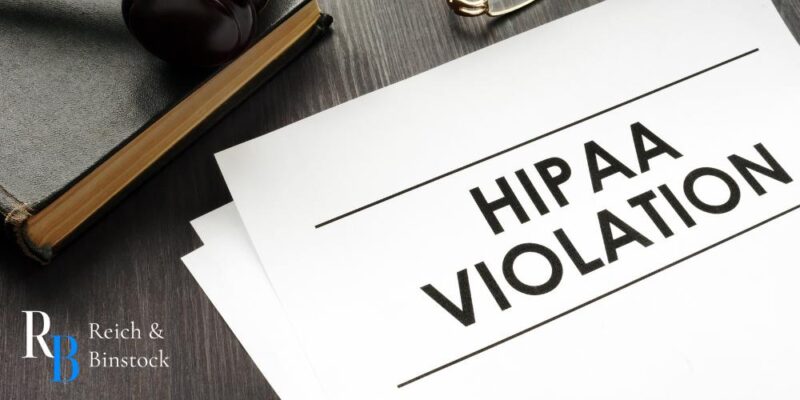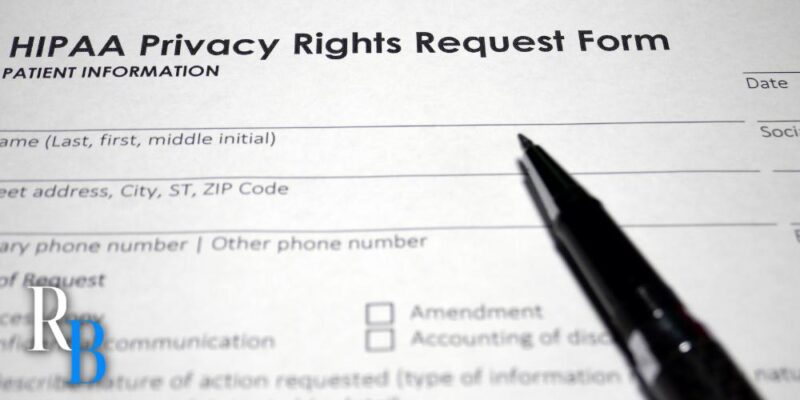HIPAA VIOLATION LAWSUIT ATTORNEY
PRACTICE AREAS
What Is HIPAA?

The Health Insurance Portability and Accountability Act is a federal law enacted in 1996. It sets the standards for privacy and security regarding patients’ identifiable health information. Specifically, HIPAA protects each patient’s personal health information, or PHI. PHI includes more than just medical information. It also includes one’s date of birth, social security number, and other identifiable information.
HIPAA requires every healthcare provider and their business associates to protect their patient’s medical information. Business associates are those who use protected health information while performing services on behalf of covered entities.
What Do HIPAA Laws Protect?
HIPAA rules cover any and all identifiable health information that is made, stored, maintained, or sent by HIPAA-covered businesses or entities. It includes many types of health information, such as electronic records, films, spoken information, and paper records.
What Is a HIPAA Violation?
HIPAA breaches happen when healthcare providers or related businesses violate the regulations outlined in HIPAA. Common examples of HIPAA breaches include the following.
- Failing to provide or complete HIPAA compliance training
- Mishandling patient records
- Sharing PHI with unencrypted technology
- Failing to get patient authorization to share private health information
- Improperly disposing of PHI, either digitally or physically
- Sharing on social media
- Having in-person discussions about patient care when those discussions are not necessary for treatment
Additionally, HIPAA violations are separated into four tiers based on severity and the level of culpability. These tiers are as follows.
- Tier 1: Violations that the provider or covered entity was unaware of and that they could not have avoided, but that could have been avoided if they had taken a reasonable amount of care to follow HIPAA rules.
- Tier 2: Violations that the provider or covered entity should have known about, but that they could not have avoided.
- Tier 3: Violations that occurred as a result of willful neglect of HIPAA regulations, but attempts have been made to correct the violation.
- Tier 4: Violations that occurred as a result of willful neglect of HIPAA regulations, but no attempts have been made to correct the violation.
HIPAA Violations vs Medical Malpractice
Because HIPAA violations and medical malpractice cases are in closely-related areas of law, you may wonder if a medical malpractice lawsuit can stem from a HIPAA violation. Most HIPAA violations are completely separate issues from medical malpractice cases. The two only overlap in rare cases.
HIPAA violations have been specified as related factors in medical malpractice cases. Both HIPAA violations and medical malpractice can put patients’ rights in danger. Medical malpractice occurs when a healthcare provider fails to uphold the accepted standard of patient care. HIPAA violations occur when a provider, insurance company, or related health entity fails to protect private health information.
Although rare, it is possible for HIPPA and medical malpractice laws to intersect. Healthcare providers have a responsibility to protect their patients’ private medical information. If a provider divulges a patient’s medical information and breaches HIPAA rules, this generally does not rise to the level of medical malpractice.
However, if a provider were to change or alter patient data, this could constitute grounds for a medical malpractice claim. The best way to know for sure is to contact a HIPAA violation lawyer about your case.
What Happens if Your HIPAA Rights Are Violated?
If you find that your HIPAA rights have been violated, we strongly recommend contacting a HIPAA lawyer as soon as possible. It may be possible to take legal action against providers who violate state laws related to protected patient information. Some states allow
What Are the Penalties for HIPAA Violations?
If a provider is found to be non-compliant with HIPAA rules, they can face very serious penalties. The civil monetary penalties they may face could range from $100 to $50,000 per violation. This largely depends on the level of blame assigned to the provider. It is also possible for them to face criminal penalties on top of those civil penalties.
Corrective action plans may also be required to rectify the issues that led to the HIPAA violation. HIPAA violation penalties are separated into four tiers depending on the level of harm caused by the violation. These tiers are as follows.
- Tier 1: Minimum fine of $100 per violation, but up to $50,000 per violation.
- Tier 2: Minimum fine of $1,000 per violation, but up to $50,000 per violation.
- Tier 3: Minimum fine of $10,000 per violation, but up to $50,000 per violation.
- Tier 4: Minimum fine of $50,000 per violation.
Can I Sue if Someone Violates HIPAA?
It depends. Technically, you cannot directly sue a provider for a violation of HIPAA rules. However, you may be able to file a claim against a covered entity for any damages you suffered as a result of the violation. In this case, the patient must be able to prove that they have suffered harm or damage from the violation. This is where having an attorney will prove invaluable.
How Do I File a HIPAA Violation Claim?
First, we recommend speaking with an attorney about your situation. They can help you file a claim with the federal government. It is recommended to do this before taking legal action at the state level. The complaint should be filed with the Department of Health and Human Services’ Office for Civil Rights.
Additionally, filers should submit their complaints within 180 days of discovering the violation. Only in rare cases can extensions be granted. If you do not contact an attorney about your situation before submitting your complaint, you should contact them immediately after submitting it.
How Much Is a HIPAA Violation Lawsuit Worth?
It depends. Class action cases against entities that have breached HIPAA rules have seen settlements of over $1 million on several occasions. However, the individual payouts for those involved in the class action claims have varied greatly. To gain a better understanding of the potential worth of your case, we recommend speaking with a HIPAA violation lawyer as soon as possible.
Why Hire an Attorney to File a HIPAA Violation Lawsuit?
HIPAA violation cases can be extremely complicated. Finding an attorney who is experienced in HIPAA violations is crucial. This can greatly improve your chances of a successful case. You may also find that joining a class action lawsuit is one of your options. This is usually the case in the event of protected health information data breaches. Again, we strongly recommend speaking with a HIPAA violation lawyer about your claim. They will evaluate the facts of your case and advise you on the best course of action.
Contact the Medical Malpractice Lawyers at Reich & Binstock Today
If you are the victim of a HIPAA violation, you have the right to file a HIPAA complaint. We strongly recommend seeking help from a skilled HIPAA violation lawyer. At Reich & Binstock, we have extensive experience litigating cases involving HIPAA violations. Your medical records and other health information must be protected by health care providers and other related entities. If medical providers, insurance companies, or others fail to protect your personal health information, they could be held liable in a HIPAA violation claim. To schedule your free consultation with us, please call our office at 713-622-7271 today.
There is never a fee unless we recover on your behalf.
Additionally, clients are not obligated to pay expenses if a recovery is not made.















